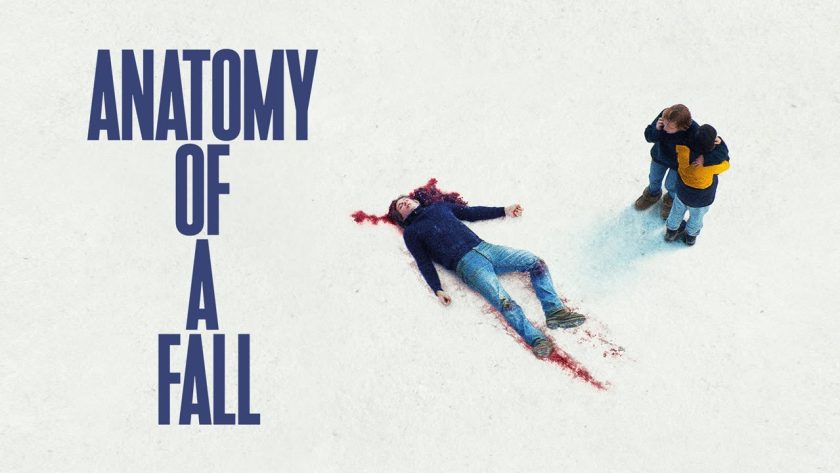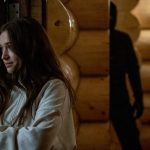Louis Pierrel reviews this year’s Palme d’Or Cannes winner, Anatomy of a Fall, a tour de force from French filmmaker Justine Triet that has been turning heads all around the country and is set to do so even more when released internationally this fall.
Warning: do not go watch this film as a family outing!!
Well one thing is for sure, Justine Triet certainly crafts a thorough anatomy (or more so two). Anatomy of a Fall is an exceptionally heavy, dense procedural drama about family dynamics that meticulously dissects both the physical fall of one and the subsequent psychological downfall of another.
The story delves into the shattered life of Sandra, a German writer, after she becomes a lead suspect in the fatal fall of her husband outside their French Alps cabin home window. The couple’s visually impaired 11-year-old son, Daniel, who is the only witness, assists in his mother’s trial as she fights to prove her innocence. Murder, accident or suicide? The premise of the tragedy is settled, one that is very reminiscent of real-life crime cases such as The Staircase and Amanda Knox, and lures the audience into a gripping circumstantial incident that is, for the next two hours and a half, gradually anatomised. I have rarely found myself so engrossed by a crime drama, but Anatomy of a Fall impressed me with its level of intensity, which is charged by slowly unveiling incredibly complex but subtle characters, during and outside of some extensive courtroom sequences that are absorbingly powerful. The film deals with the incident by examining it through both the lens of the juridical system (in the public sphere) and the characters’ psychoanalytical behaviours (behind closed doors in their intimacy), which serves as a captivating dichotomy to interpret from.
Perhaps the most unnerving part of Anatomy of a Fall is how real and grounded it feels. The plot stems from nothing out of the ordinary but something that could happen to any of us. What if one day, for unexplainable reasons, we are swept into a nation-wide case and find ourselves drowning amidst the turmoil of media frenzy? From the writing and the dialogue to the performances and the lack of external music, everything intends to feel like we are witnessing this trial ourselves and are subject to the characters’ environment. With a screenplay that often scratches the borders of cinema-verité and documentary filmmaking, the lines between fiction and reality are intrinsically blurred, as if Justine Triet had simply placed her camera in the courtroom and started recording. It particularly feels like she treats the court as a theatre stage, since the characters (especially the lawyers) seem like they have come straight out of a Shakespearean play. The prosecutor’s lawyer, played to a heightened degree by Antoine Reinartz (maybe slightly too much that it becomes cliché and out of place compared to the subtlety of the rest of the film?), goes on a ramble about how Sandra’s novels and their autofictive tendencies share some concerning similarities to the real-life case, where the idea of a book within a book, a play within a play, or even a film within a film is firmly present. However, probably the most realistic portrayal in the film takes place during the third act when we get to hear a voice recording blaring through the courtroom speakers of the couple arguing the day before the husband’s fall, from which we are transported to that moment in a flashback (one that is done here tastefully and feels justified in the context of the trial). The way it flows, grows and lingers for an uncomfortable amount of time, especially with the knowledge of what will happen the following day, is gut-wrenching and unbearably tough to watch. It’s a scene that gets so realistic to the point it is concerning when you realise Justine Triet co-wrote the script with her partner Arthur Harari. Even more when, in the scene, the two authors are arguing about Sandra plundering an extract from one of her husband’s books. Mere fiction or sensationalised inspiration? Again, the parallels between autofiction and reality intersect at the core of this film.
Talking about the sense of realism in the film seems like a good transition to talk about its masterful use of the senses. As previously mentioned, the lack of an external soundtrack coming from outside the scenes themselves enables the film to stay grounded. It’s a technique that is distinctively used after the prologue during the opening credits: a haunting sequence in which we are shown a series of blurred, grainy film stills of the once (seemingly) happy family before the incident. The scene is layered with what sounds like a piece of music added in post-production but is eventually revealed to be Daniel playing the piano, which then helps us shift to the first act. Justine Triet mentions that her film is fundamentally guided by the senses and that sound in itself is a pivotal character throughout the story. In the opening scene, sound is what guides us through the different levels of the house and indicates to us the whereabouts of each character (voice echoes, footsteps, a ball falling down the stairs, an instrumental cover of P.I.M.P playing on a distant speaker…), and that is because ultimately, it is what Daniel heard in those moments that will later become decisive in the trial. The senses are the common thread in Anatomy of a Fall, and Justine Triet utilises them expertly to remind us of their primitive but sometimes deceiving nature.
How could I write this review without praising Sandra Hüller’s triumph of a performance that stands on the same level as Cate Blanchett in Tár? The German actress (which, again, weaves into reality as she shares the same name and country of origin as her character) offers one of the most monumental portrayals of this year as of now, playing a deeply layered character that feels both cold and empathetic. In public settings, Hüller’s delivery transcends into a gentle way of well-socialised dance but with a slight maladjustment that tends to turn against her. She is equally reciprocated as a victim and an unreliable, at times unusual character, leaving the audience with enough reasonable doubt to never fully trust our protagonist. Hüller’s performance also comes across as profoundly vulnerable and alienated since the film also deals with language barriers and the sense of feeling isolated in a foreign country. In fact, not once do we hear the character speak her native language. Sandra constantly shifts between French and English throughout the film, with often visible difficulties in answering questions facing the court.
All in all, Anatomy of a Fall appears to be one big agglomeration of ideas. It’s a film about the harsh realities of a flawed, sometimes absurd, justice system and its irreparable psychological costs on its subjects, squeezing in every vulnerable state of the human experience. A film about warping reality and twisting words, where facts and certain events are taken out of context to dominate the trial. But it’s also a film about guilt: the father’s guilt of being indirectly responsible for his son’s disability, and Sandra’s guilt for possibly pushing her husband over the edge (literally or figuratively?). It’s a film about the ambiguity of things, a sort of organised chaos from which we can draw our own presumptions, and where there is still some sort of fogginess that floats in the air. It’s also a film about a young kid grappling with his mother’s guilt in a domestic conflict, who’s pressured to remember every tainted memory of his parents’ relationship in order to testify. However, Anatomy of a Fall is, in particular, a film that deals with moral dilemmas, merging polarities and parallels of facts versus feelings, truth versus assumptions, objectivity versus subjectivity, intimacy versus vulnerability and autofiction versus reality.
Ultimately, Justine Triet proves to be in full command of her craft and fully deserving of the Palme d’Or, being the third woman only to ever win the award. Anatomy of a Fall is an unbearably tense and sharply directed puzzle that is cold, ruthless but hopeful and offers a layered, subtle and emotionally charged story that, in a way, shines quietly.
Watch the (very Americanised) trailer for Anatomy of a Fall here:




